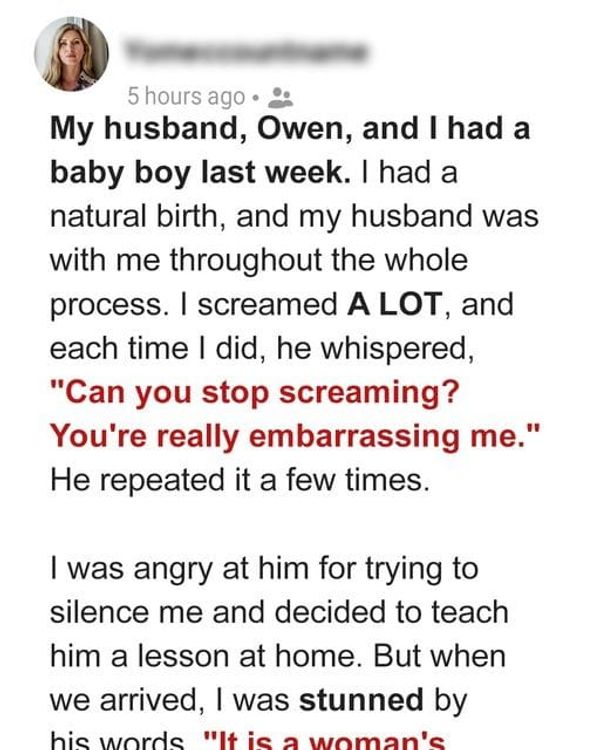Last week, my husband Owen and I experienced the joy and pain of welcoming our baby boy into the world. It was a long and challenging process, but I was determined to have a natural birth. Owen stood by my side, offering his support and holding my hand throughout the labor. However, as the intensity of the pain increased, so did my screams.

During these moments of agony, Owen leaned in and whispered, “Can you please stop screaming? You’re embarrassing me.” His words pierced through the fog of pain, leaving me both furious and hurt. He repeated his plea multiple times, and with each one, the sting grew stronger.
After our son was born and we found ourselves resting in the hospital room, my anger towards Owen persisted. When we finally arrived home with our baby boy, I still couldn’t shake off the frustration. I couldn’t understand why Owen didn’t express any remorse or offer an apology. He seemed distant and preoccupied, which puzzled me. I knew I had to have a serious conversation with him.
“Owen, we need to talk,” I said, trying my best to maintain a calm and composed voice, despite the anger simmering within me.
He looked up from setting up the baby’s crib and asked, “What is it?”
“I can’t believe you had the audacity to tell me to stop screaming during labor. Do you have any idea how much pain I was in?” I felt my voice break with emotion.
Owen let out a sigh and ran a hand through his hair. Surprisingly, his tone remained calm as he said, “It is a woman’s job to be strong and composed. I just wanted you to be strong for our son.”
His words left me stunned. “A woman’s job?” I repeated, incredulous. “Do you even hear yourself, Owen? Do you understand what childbirth is like?”
He looked at me, finally showing a glimpse of vulnerability. “I didn’t know how to handle seeing you in so much pain. It scared me, and I felt helpless. I thought if you could stay calm, it would make everything better.”
Tears filled my eyes, but this time not from anger. Instead, I felt an overwhelming sadness. “Owen, childbirth isn’t something that can be controlled with composure. It’s a raw, painful, and powerful experience. I needed your support, not your criticism.”
Owen’s shoulders slumped, and he came over to sit beside me. “I’m sorry,” he said quietly. “I was wrong. I was so focused on my own feelings that I didn’t consider yours. I promise I’ll do better.”
I took a deep breath, feeling the tension starting to dissipate. “I need you to understand that my pain and emotions during labor were valid. I need you to be there for me, not just physically, but emotionally as well.”
Owen nodded, regret evident in his eyes. “I understand. I will make it up to you, I swear.”
As we sat there together, our newborn son peacefully sleeping in his crib, I realized that this was just the beginning of a new chapter in our lives. There would be challenges, misunderstandings, and moments of hurt, but there would also be love, growth, and learning.
In the following days, we adjusted to our new roles as parents. Owen made a conscious effort to be more understanding and supportive, and I noticed a genuine change in his attitude. He became more involved, not only in caring for our son but also in supporting me as I recovered from childbirth.
One evening, as we sat together, Owen turned to me and said, “I’ve been reading about childbirth and postpartum care. I had no idea how much women go through. I’m deeply sorry for how I acted. You’re incredibly strong, and I’m so proud of you.”
His words brought tears to my eyes once again, but this time, they were tears of relief and gratitude. “Thank you, Owen. Your support means the world to me.”
Our journey as new parents had just begun, but I felt hopeful. We were learning together, growing together, and through it all, we had each other. As I gazed at our sleeping baby, I knew that the love we shared would guide us through any challenges that lay ahead.





